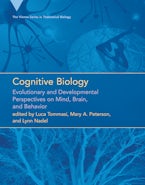If you want to know what RECS is about, this [book] is a good clear place to turn. If you already like RECS, but want to understand the conceptual basis and implications, this is for you.
David Cole
Minds and Machines
In this challenging, wide-ranging, and truly provocative treatment, Anthony Chemero presents a vision of cognition in which unified animal-environment systems take center stage, and in which complex couplings un-chaperoned by internal representation are the stuff of which minds are made. Recommended reading for all those who fear that the embodied mind is just the disembodied mind with wheels on.
Andy Clark, Professor of Logic and Metaphysics, School of Philosophy, Psychology, and Language Sciences, University of Edinburgh, Scotland, UK
Shall we be present, or shall we re-present? Chemero argues for the former view in a volume that is smart, accessible, and engaging. The book provides an excellent summary of the central conceptual issues in cognitive science, focusing on the role of the ecological approach to perception and action in the development of embodied cognitive science. It is rambunctious, opinionated, and heterodox. It is also fun to read.
Thomas A. Stoffregen, School of Kinesiology, University of Minnesota
This is a timely and provocative presentation of what cognitive science without computation or inner representations might look like. Driven by real science rather than abstract thought-experiments, Chemero weds two underappreciated frameworks—dynamic systems theory and Gibsonian ecological psychology—to construct a compelling picture of embodied cognitive science. Anyone interested in situated or embedded cognition, or, for that matter, in intriguing new ways of thinking about thinking, ought to read this book.
William Ramsey, Department of Philosophy, University of Nevada, Las Vegas
Behavior and cognition are grounded in the dynamical interaction of brains, bodies, and environments! In a refreshingly clear-headed model for how philosophical analysis can contribute to the science of cognition, Chemero articulates a vision for radical embodied cognitive science composed of equal parts dynamical systems theory and Gibsonian ecological psychology. A rich and fascinating book.
Randall D. Beer, Cognitive Science Program, Indiana University
Chemero's cognitive science is a science of the animate (not the artificial) and its philosophical trappings are those of pragmatism (not computational functionalism). It is advanced without hubris, emerging from select hypotheses, data, and models interwoven with critical examinations of the ideas of both friend and foe. Newcomers to the travails of cognitive science will find much to bother about, hardened old timers will find much to be bothered by. In short, Radical Embodied Cognitive Science is a book for the science's generations.
Michael T. Turvey, Trustees' Distinguished Professor (Emeritus), University of Connecticut, and Senior Research Scientist, Haskins Laboratories
Using an artful combination of dynamical systems theory and the overarching framework of ecological psychology along with clear-cut examples, Chemero offers a radical alternative to classic representationalist accounts of cognition. What makes this book an exceptional read is not just that it's written with wit and style, but that Chemero does not beat about the bush. He actually wants to get rid of internal representations altogether and proposes a way to do it.
J. A. Scott Kelso, Center for Complex Systems and Brain Sciences, Florida Atlantic University, and co-author of The Complementary Nature












